|
|
|
Sort Order |
|
|
|
Items / Page
|
|
|
|
|
|
|
| Srl | Item |
| 1 |
ID:
132902
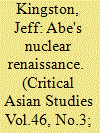

|
|
|
|
|
| Publication |
2014.
|
| Summary/Abstract |
Prime Minister Abe Shinz()'s nuclear renaissance involves downplaying risks, restarting reactors, building new ones, and exporting reactor technology and equipment. Polls in japan indicate that the public remains overwhelmingly op- posed to Abe's nuclear agenda, but in various national and local elections since late 2012 antinuclear candidates have not fared well. This article examines the disjunc-ture between public preferences and electoral outcomes and why is it likely that Japan will restart reactors despite widespread concerns about safety, the high costs of nuclear energy, and the lack of a site for permanent disposal of nuclear waste. The safety myth is being reealibrated, but the author argues that it remains based on rosy assumptions in a nation especially prone to massive seismic disasters. The reinstatement of nuclear energy in the 2014 national energy policy marks a victory for the nuclear village, a remarkable example of institutional resilience in the face of extremely adverse developments since the massive earthquake and tsunami of 1 1 March 2011 that precipitated three reactor meltdowns in Fukushima. Despite extensive revelations about shoddy safety practices in the nuclear industry and collusive relations between regulators and those they regulate, Abe has successfully promoted a nuclear revival that few would have thought possible before his election in 2012. Reactor restarts face a number of hurdles, but the pronuclear lobby now finds it has a policy opening. The summer of 2014 has been a nuclear-free one, but in all likelihood it will be Japan's last for decades to come.
|
|
|
|
|
|
|
|
|
|
|
|
|
|
|
|
| 2 |
ID:
102392
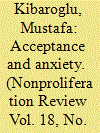

|
|
|
|
|
| Publication |
2011.
|
| Summary/Abstract |
US nuclear weapons have been an important part of Turkey's security strategy since their first deployment on Turkish soil in the early 1960s. Turkey's NATO membership and its close relationship with the United States have been perceived to be integral to maintaining its security. The release of the 2010 US Nuclear Posture Review (NPR), with its focus on disarmament and reduced reliance on nuclear weapons, has a number of potential consequences for Turkey. This article provides background on the history of Turkish-US nuclear weapons policy in light of issues ranging from Middle Eastern politics to the development of NATO's new Strategic Concept. It then describes how actors in the government, military, and academia in Turkey have reacted to the NPR, why they reacted as they did, and how the Obama administration's initiatives may be received in Turkey in the future. This article concludes that both military and civilian actors in Turkey have reacted favorably to the NPR and are pleased by its emphasis on nuclear nonproliferation and the maintenance of extended deterrence; however, there is less agreement in Turkey about the emphasis placed by the NPR on the danger of nuclear terrorism.
|
|
|
|
|
|
|
|
|
|
|
|
|
|
|
|
| 3 |
ID:
101078
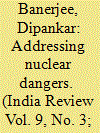

|
|
|
|
|
| Publication |
2010.
|
| Summary/Abstract |
China has been a nuclear weapon power since October 1964 and India and Pakistan openly since May 1998. Each had its own reason to acquire nuclear weapons-Pakistan to counter India, India to counter both Pakistan and China, and Beijing has always viewed the U.S. and for some time the former Soviet Union as possible nuclear threats. Within Asia, no meaningful dialogue has ever been carried out between China, India and Pakistan on nuclear issues: either on confidence building, doctrine and safety, or on each other's perception of the nuclear threat. Even necessary risk reduction measures have not been attempted. However, some Track Two level dialogues have taken place and this has contributed to some understanding of nuclear policies, strategies and doctrines. In this backdrop, the present study examines the doctrine, strategy and command, and control arrangements prevailing in these countries and recommends the necessary confidence-building measures. These include greater transparency on doctrine, clearer examination of likely strategy and means to universalize "no first use."
|
|
|
|
|
|
|
|
|
|
|
|
|
|
|
|
| 4 |
ID:
128682
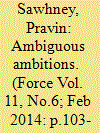

|
|
|
| 5 |
ID:
099519
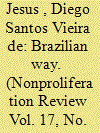

|
|
|
|
|
| Publication |
2010.
|
| Summary/Abstract |
This article examines the positions held by Brazil under the administration of Luiz Inaacutecio Lula da Silva (2003-present) on nuclear nonproliferation, arms control, and disarmament regimes and on contentious issues in those areas. Under Lula's government, Brazil has wanted to mediate between nuclear weapon and non-nuclear weapon states to consolidate its position as a strong negotiator and to benefit from the possible gains of this position in terms of greater participation in international institutions. It has also wanted to pressure nuclear weapon states to fulfill their disarmament obligations in order to reduce asymmetries in its relations with powerful nuclear weapon countries. At the same time, Brazil has tried to preserve its autonomy and flexibility to protect commercial secrets and preserve national security in relation to its own nuclear program.
|
|
|
|
|
|
|
|
|
|
|
|
|
|
|
|
| 6 |
ID:
162686
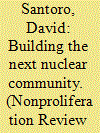

|
|
|
|
|
| Summary/Abstract |
This viewpoint takes stock of the changes in the strategic nuclear landscape in recent decades and reflects on its consequences on the policy community. It finds that the number and scope of issues have expanded considerably; they have manifested themselves in many more regions of the world; and they have become deeply politicized and polarized. The consequences have been twofold: the nuclear policy field has seen the development of an increasingly diverse expert community composed of highly specialized functionalists and regionalists, and it has become ever more divided into two entirely separate ideological camps—one that believes in deterrence, the other in disarmament. The stove-piping of expertise and the widening gap between deterrence and disarmament ideologies are immensely problematic because, in different ways, they stand in the way of the emergence of a better and safer nuclear future. Looking ahead, it is critical to “bust the silos of expertise” and to build bridges between the deterrence and disarmament ideological camps. Only such a community-building effort will help solve today’s and tomorrow’s nuclear challenges.
|
|
|
|
|
|
|
|
|
|
|
|
|
|
|
|
| 7 |
ID:
130415
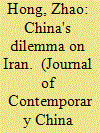

|
|
|
|
|
| Publication |
2014.
|
| Summary/Abstract |
As international pressure on China's policy concerning its increasing investments in Iran grows, the Chinese leadership has to painfully balance its impulse toward energy and economic cooperation with Iran against other important interests, including enhancing its image as a responsible big country. After analyzing the evolution of China-Iran energy relations, this paper tries to answer the question of how China has responded to the intensification of US-led sanctions against Iran, what merits and shortcomings China's attempts to balance or reconcile its interests in Iran might create, and what options China can take to deal with a possible oil crisis.
|
|
|
|
|
|
|
|
|
|
|
|
|
|
|
|
| 8 |
ID:
054075
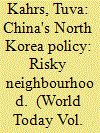

|
|
|
| 9 |
ID:
140977
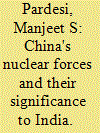

|
|
|
|
|
| Summary/Abstract |
The Indian nuclear program is a response to a perceived politico-strategic threat from China as opposed to a military-operational one that New Delhi began after perceiving an “ultimatum” from China in 1965. Consequently, India is in the process of acquiring an assured second-strike capability vis-à-vis China to meet the requirements of general deterrence. While India has always been concerned about the Sino-Pakistani nuclear/missile nexus, China has become wary of the growing military ties between the United States and India in recent years, especially because of the military implications of the US-India civil nuclear deal. Given the growing conventional military gap between the two states, India is not lowering its nuclear threshold to meet the Chinese conventional challenge. Instead, India is upgrading its conventional military strategy from dissuasion to deterrence against China. While the overall Sino-Indian nuclear relationship is stable, it will be challenged as China acquires advanced conventional weapons that blur the distinction between conventional and nuclear conflict.
|
|
|
|
|
|
|
|
|
|
|
|
|
|
|
|
| 10 |
ID:
015000
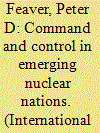

|
|
|
|
|
| Publication |
1992-93.
|
| Description |
160-187
|
|
|
|
|
|
|
|
|
|
|
|
|
|
|
|
| 11 |
ID:
140973
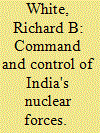

|
|
|
|
|
| Summary/Abstract |
The Indian government has not made a public comment about the status of its nuclear weapon program since approving a nuclear doctrine in 2003. However, there is now enough information in the public domain to determine that the command-and-control system for the nuclear program has steadily matured in accordance with the intent of the approved nuclear doctrine. The Indian government has successfully mitigated many of the issues that plague the conventional military. The result is a basic command-and-control system that is focused only on the delivery, if ordered by the prime minister, of nuclear weapons. The system is not as robust as those of the United States and Russia, but is in place and ready as new Indian nuclear weapons enter into operation. The command-and-control system is developing to meet India's needs and political compulsions, but not necessarily as part of a more assertive nuclear policy.
|
|
|
|
|
|
|
|
|
|
|
|
|
|
|
|
| 12 |
ID:
129134
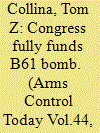

|
|
|
|
|
| Publication |
2014.
|
| Summary/Abstract |
Striking a compromise on a controversial issue, Congress in January passed legislation to provide $537 million, the full amount the Obama administration had requested, for the program to rebuild the B61 nuclear gravity bomb and require the administration to submit detailed reports on alternatives to this plan. Congress also mandated the eventual retirement of a different gravity bomb, the B83, once the B61 is ready for service. These items were part of an omnibus appropriations bill signed by President Barack Obama on Jan. 17. The new law is a $1.1 trillion conglomeration of 12 appropriations bills that had to be passed to keep the government open for the remainder of the fiscal year, which ends Sept. 30. The legislation includes $7.8 billion for nuclear weapons activities conducted by the Energy Department's semiautonomous National Nuclear Security Administration (NNSA). One of the key nuclear policy questions left unresolved last year was how much money the NNSA would be allowed to spend to extend the service life of about 400 B61 gravity bombs. About half of the B61s are stored in European NATO countries for use on tactical, or short-range, aircraft; the rest are stored in the United States for use on strategic, or long-range, bombers.
|
|
|
|
|
|
|
|
|
|
|
|
|
|
|
|
| 13 |
ID:
131617
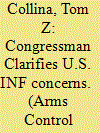

|
|
|
|
|
| Publication |
2014.
|
| Summary/Abstract |
A U.S. congressman provided new details in late April about the Obama administration's allegation that Russia may be breaching a key U.S.-Russian arms control treaty, stating that Moscow may have tested a cruise missile from a prohibited launcher. At a joint April 29 hearing of two House Foreign Affairs Committee panels, Rep. Brad Sherman (D-Calif.) said that Russia claims to have tested an intermediate-range missile for use at sea, which is allowed under the 1987 Intermediate-Range Nuclear Forces (INF) Treaty, but that Moscow used "what appears to be an operational, usable ground-based launcher," which is not allowed. Sherman said that "it appears as if [the Russians] were developing a ground-based capacity for this intermediate missile.
|
|
|
|
|
|
|
|
|
|
|
|
|
|
|
|
| 14 |
ID:
109889
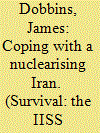

|
|
|
| 15 |
ID:
131320
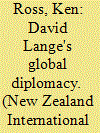

|
|
|
|
|
| Publication |
2014.
|
| Summary/Abstract |
Of New Zealand's fifteen prime ministers since 1945, David Lange has been written about the most in regards to his global diplomacy. He is the one who has written the most insightfully on his own prime ministerial time, particularly about his global diplomacy. Lange gave the Kirk brand--New Zealand as a progressive small state, with a deep internationalism central to our national identity--a new impetus. His standout achievement was in promoting New Zealand's enduring non-nuclear status. He also secured invaluable exposure for New Zealand beyond our traditional audiences in Canberra, London and Washington and repolished New Zealand's good international citizenship credentials
|
|
|
|
|
|
|
|
|
|
|
|
|
|
|
|
| 16 |
ID:
065752
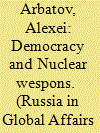

|
|
|
| 17 |
ID:
104651
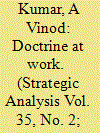

|
|
|
|
|
| Publication |
2011.
|
| Summary/Abstract |
President Obama made history by coming to office with the promise of working towards a nuclear weapons-free world. Envisioning a new non-proliferation momentum, Obama promised to revive the Treaty on the Non-Proliferation of Nuclear Weapons (NPT) system and create nuclear security and energy architectures that will secure nuclear materials and make proliferation difficult. A year later, Obama realised the difficulties of selling his vision to his bureaucratic-military establishment, which resisted efforts to reduce the role of nuclear weapons while pushing for nuclear modernisation. As Obama's nuclear policy evolves, India is apprehensive that its terms of engagement with the regime could be redefined by Obama. Re-emergence of the traditional divergences on non-proliferation now seems a potential outcome.
|
|
|
|
|
|
|
|
|
|
|
|
|
|
|
|
| 18 |
ID:
013904
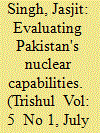

|
|
|
|
|
| Publication |
1992.
|
| Description |
16-21
|
|
|
|
|
|
|
|
|
|
|
|
|
|
|
|
| 19 |
ID:
132674
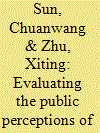

|
|
|
|
|
| Publication |
2014.
|
| Summary/Abstract |
After the Fukushima nuclear accident, more and more attention has been paid to the safety issues of nuclear power in China, even though it is a clean and necessary substitution to coal power. Due to the consideration about the uncertainty of nuclear safety, the local citizens may resist the nuclear power programs in their neighborhood, as indicated by the anti-nuclear movement in Jiangmen 2013. This phenomenon is often related to the public perceptions of "not-in-my-back-yard" (NIMABY). The explosion of anti-nuclear movements will impose adverse effects on the nuclear power decision-making in China. Based on the Contingent Valuation Method (CVM), we evaluate the public Willingness-To-Pay (WTP) for avoiding the construction of nuclear power plants in their neighborhood. Moreover, we analyze whether more information about nuclear energy could improve the public acceptance. Our results show that the comprehensive information will decrease the public risk perception of nuclear power and increase the public support for nuclear power policy. This paper further suggests that China×s decision makers should improve policy transparency and encourage the public involvement of nuclear energy decision making.
|
|
|
|
|
|
|
|
|
|
|
|
|
|
|
|
| 20 |
ID:
075244
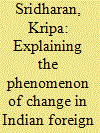

|
|
|
|
|
| Publication |
2006.
|
| Summary/Abstract |
This paper seeks to explain the conditions under which governments decide to change the course of their foreign policy using the National Democratic Alliance regime of India as a case study. The foreign policy change literature is rich in insights about the sources, conditions and consequences of change. The relevant findings from the literature are used to analyse the nature and degree of change in Indian foreign policy under the National Democratic Alliance government in two areas: nuclear policy and Indo-US relations. While it is generally conceded that India changed the course and content of its policy in the late 1990s, the reasons and impact of the change are still a matter of debate. There is also no agreement on whether India has just made some adjustment changes or a fundamental shift in its orientation. This paper uses relevant indicators to establish the nature, level and degree of change in India's policy, and examines whether policy alterations were merely reactive, incremental and ad hoc, or whether they represented a conscious design comprising clear objectives and supportive strategies.
|
|
|
|
|
|
|
|
|
|
|
|
|
|
|
|
|
|
|
|
|